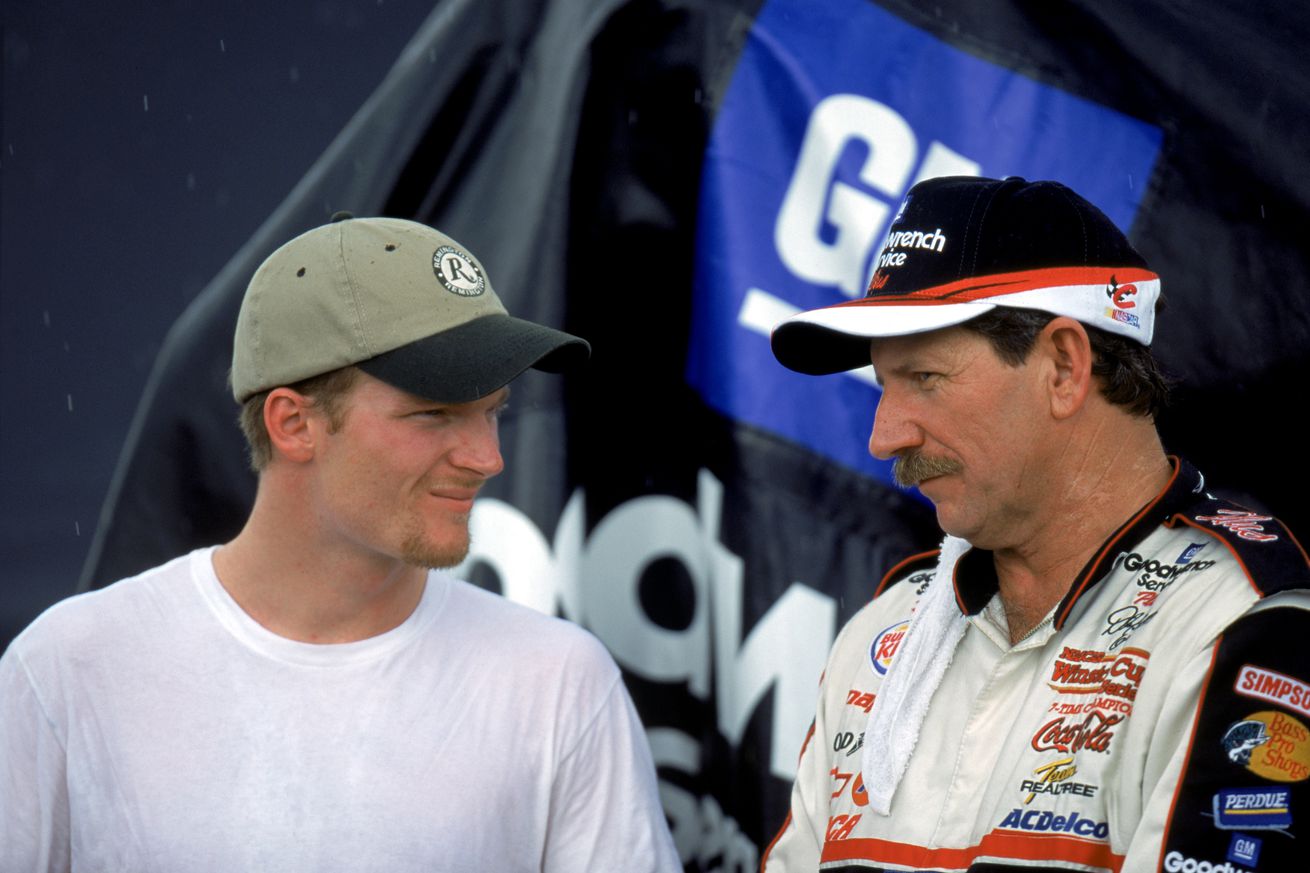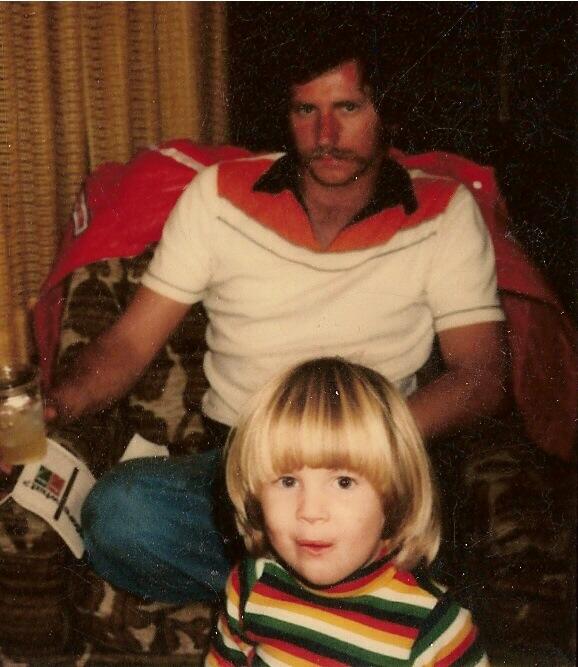SB*NATION
© 2016 Vox Media, Inc. All Rights Reserved
New book delves into Dale Earnhardt’s complicated legacy.
Since Dale Earnhardt's death on the final lap of the 2001 Daytona 500, he has become an almost mythical figure. To a large segment of fans, the seven-time Cup Series champion is the embodiment of what a NASCAR driver should represent: a tough, often ruthless, blue-collar man born and raised in North Carolina, the hub of stock car racing.
But while lauded and often lionized as a demigod, Earnhardt was far from perfect -- both on the track and away. For many years, especially when they were young, Earnhardt had a complicated and almost nonexistent relationship with his three oldest children, Kerry, Kelley and Dale Jr., who himself evolved into star NASCAR driver.
It is that family dynamic -- between Earnhardt and his children, and they with Earnhardt's third wife, Teresa -- that is the subject of the new book "Earnhardt Nation: The Full-Throttle Saga of NASCAR's First Family" (Feb. 16, Harper Collins) by Jay Busbee.
Busbee, a longtime NASCAR reporter for Yahoo, spoke in-depth with SB Nation regarding the Earnhardt family legacy, the strong bond Earnhardt Sr. and Earnhardt Jr. eventually developed over time and how Earnhardt Sr.'s death forever changed NASCAR.
The following questions and answers have been edited for clarity.
SB Nation: You begin "Earnhardt Nation" with Dale Earnhardt's death on the final lap of the 2001 Daytona 500. To a casual fan or a non-NASCAR fan, how would you describe the after effects of Earnhardt dying in what is NASCAR's biggest race?
Busbee: It's not an exaggeration to say Earnhardt being killed is the equivalent of LeBron James dropping dead in Game 7 of the NBA Finals or Tiger Woods dropping dead on the 18th green of The Masters. This was something that happened to the sport's biggest star in the sport's marquee event. You don't want to be glib about it or too grim, but imagine if Peyton Manning leads the Denver Broncos to a title then collapses and dies as the seconds are running out. That's the level of impact. That was the level of weight this carried. It was so unbelievably devastating to NASCAR and the grief so deep that those who didn't understand NASCAR didn't comprehend it until that grief came pouring out like a tsunami.
SBN: While a tragedy, can you illustrate the positives that came about because of Earnhardt's untimely death?
Busbee: You hate to say there were good things that came of what happened, but it's indisputable on two fronts. First of all, NASCAR become more popular because those apart from the typical southern fan base realized it was a fascinating sport. Stock car racing isn't football or baseball, but it is something really special. That clicked with a lot of people. The second aspect is safety because there are a number of drivers who would not be here with us today without the safety measures brought about as a result of Earnhardt's accident.
Elliott Sadler told me directly, he believes he would be dead based on the severity of a wreck he had at Pocono where his engine was ripped from his car if the improvements weren't made to the track. You never want to say anything good happened because of it or say something was worth it, but the main thing is safety improvements NASCAR fast-tracked because of Earnhardt's death.
Busbee: He had a terrible early relationship with his first three kids, and he admitted as much. He was gone all the time racing, he left them in the care of Teresa or nannies. They desperately craved a closeness with their father, however those moments were brief and fleeting. However, by the time Earnhardt passed his mid-40s and had his daughter, Taylor, with Teresa he had a much closer relationship with her earlier on than he did with Kerry, Dale Jr. and Kelley. And he recognized when he had (youngest daughter, Taylor) what he missed out on with his other three kids. The great tragedy is when Earnhardt was killed, he was really rebuilding those relationships with his three older kids, who all recognized and appreciated it.
SBN: When you look at Dale Earnhardt Jr. and the relationship he was building with his father that also coincided with his rise as a driver, how would you describe the relationship between the two at the time of Earnhardt's death?
Busbee: It was as good as it ever was. Everything was perfect between these two. You can knock Dale Sr. for not really connecting with his son until his son started racing, but we all connect with our fathers in different ways. And for both, that was a way for them to relate to one another. The real tragedy is that they were on their way to having a deeper relationship and better understanding of the other. They loved racing each other, they raced hard and they had a lot of fun at the other's expense. It was a strong relationship at the end.
SBN: As you detail the strong relationship between Dale Earnhardt and Dale Earnhardt Jr., how would you describe the relationship Earnhardt Jr. had with his stepmother Teresa? Frosty? Nonexistent?
Busbee: (Laughing) Frosty would probably be a good way to put it. There were a number of instances from those I spoke to who said the relationship never really grew beyond stepmother-child dynamic that existed when they first met. To some extent that's an issue every parent has as a child grows older, as the relationship can be frozen in that you always think of them as a child even though they're an adult. On that same token, people have to grow and change and respect that growth. And if I had to surmise, I would say Teresa was slow to recognize just how much Junior had grown into his own man after his father's passing. She also miscalculated by taking a very hardline stance with him when it came to contracts and business dealings, which played a significant factor in Junior deciding to move on from Dale Earnhardt Inc. (the NASCAR team Earnhardt owned). It was ill-advised by Teresa and you saw that in what happened to DEI after Junior left.
SBN: Was there any way the relationship between Earnhardt Jr. and Teresa could have been salvaged to the point where Earnhardt Jr. didn't feel compelled to leave DEI following the 2007 season, thus preventing the team and the legacy it represented from essentially collapsing?
Busbee: I try in the book to demonstrate that there are no absolute heroes and no absolute villains, to show people in their complexity. Teresa was juggling two different things; she was juggling the race team along with the brand of Dale Earnhardt, which to this day is still very prominent in the infield at every race track. And she made her decision to put her efforts more into the branding rather than the team, and that's why the relationship with Dale Jr. suffered. Could it have been salvaged? Absolutely, had she and her advisors chosen to focus more on the team, as Dale Jr. complained that she didn't do enough of. Instead of DEI being a race team with a strong brand, it became more a brand management company than anything else.
SBN: What stood out to you about the way Earnhardt Jr. handled the death of his father?
Busbee: One of the things that impressed me most was I got a real appreciation for how well Junior handled everything that was laid on him. It's not just the business obligation of having to go on and race every single week, it's the grief he had to process while doing so. Twice a year he has to go back to Daytona and go past the same spot where his father died. That takes a level of spine and courage that people take for granted until you really sit back and take in everything he had to deal with. He handled everything with great maturity.
"Earnhardt Nation: The Full-Throttle Saga of NASCAR's First Family" is available Feb. 16.



No comments:
Post a Comment